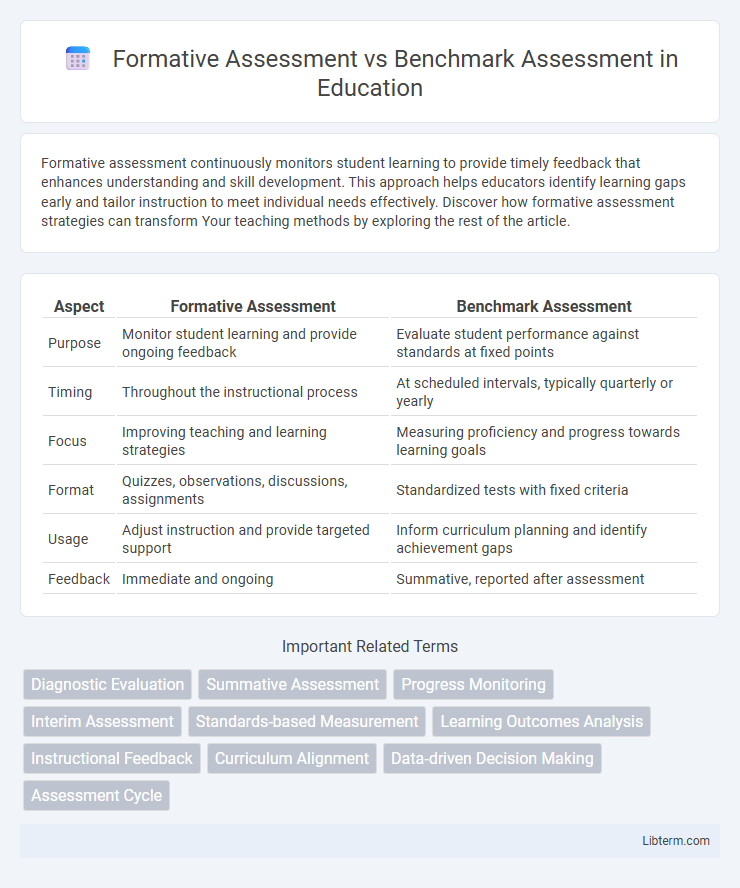Formative assessment continuously monitors student learning to provide timely feedback that enhances understanding and skill development. This approach helps educators identify learning gaps early and tailor instruction to meet individual needs effectively. Discover how formative assessment strategies can transform Your teaching methods by exploring the rest of the article.
Table of Comparison
| Aspect | Formative Assessment | Benchmark Assessment |
|---|---|---|
| Purpose | Monitor student learning and provide ongoing feedback | Evaluate student performance against standards at fixed points |
| Timing | Throughout the instructional process | At scheduled intervals, typically quarterly or yearly |
| Focus | Improving teaching and learning strategies | Measuring proficiency and progress towards learning goals |
| Format | Quizzes, observations, discussions, assignments | Standardized tests with fixed criteria |
| Usage | Adjust instruction and provide targeted support | Inform curriculum planning and identify achievement gaps |
| Feedback | Immediate and ongoing | Summative, reported after assessment |
Understanding Formative Assessment
Formative assessment is an ongoing process that provides immediate feedback to students and educators, enabling adjustments in teaching strategies to improve learning outcomes. It includes quizzes, observations, and discussions designed to identify students' strengths and areas for improvement during the instructional process. Unlike benchmark assessments, which evaluate cumulative knowledge at set points, formative assessment fosters continuous understanding and skill development in real-time.
What is Benchmark Assessment?
Benchmark assessment is a type of evaluative tool used periodically throughout an academic year to measure students' proficiency against established standards or grade-level expectations. It provides educators with data on student performance trends, guiding instructional planning and identifying areas requiring intervention before high-stakes testing. Unlike formative assessment, which offers continuous feedback during lessons, benchmark assessments serve as checkpoints to evaluate cumulative learning progress at specific intervals.
Key Differences Between Formative and Benchmark Assessments
Formative assessments provide ongoing feedback during the learning process to help educators identify student strengths and areas for improvement, promoting instructional adjustments and personalized support. Benchmark assessments are periodic evaluations aligned with standards that measure student progress against grade-level expectations and predict performance on summative tests. Key differences include the timing, purpose, and use of results: formative assessments are informal and diagnostic, while benchmark assessments are formal, standardized, and used for progress monitoring and accountability.
Purposes of Formative Assessment
Formative assessment primarily aims to monitor student learning and provide ongoing feedback that instructors can use to improve teaching and student performance. It helps identify learning gaps and misconceptions early, allowing for timely intervention to support student growth. Unlike benchmark assessments, which evaluate progress at set points to measure overall achievement, formative assessments foster continuous improvement and guide instructional adjustments.
Goals of Benchmark Assessment
Benchmark assessment aims to measure student performance against established standards at specific points during the academic year to track progress and predict proficiency on high-stakes tests. It identifies strengths and weaknesses across grade levels, guiding instructional adjustments and resource allocation. These assessments provide data-driven insights to improve student outcomes and ensure alignment with curriculum goals.
Timing and Frequency of Assessments
Formative assessments are conducted frequently throughout the learning process, providing immediate feedback to guide instruction and support student growth in real time. Benchmark assessments occur periodically, often quarterly or at key points in the academic year, to evaluate cumulative progress against established standards. The timing of formative assessments allows for ongoing adjustments, while benchmark assessments serve as checkpoints to measure overall achievement and readiness.
Role in Student Learning
Formative assessment plays a critical role in student learning by providing ongoing feedback that helps educators identify students' strengths and weaknesses, allowing for real-time instructional adjustments to improve understanding. Benchmark assessment, conducted periodically throughout the academic year, evaluates student progress against predetermined standards, offering a snapshot of achievement and informing longer-term instructional planning. Together, these assessments support differentiated instruction and targeted interventions to enhance overall academic growth.
Impact on Instructional Strategies
Formative assessment provides real-time feedback that enables teachers to adjust instructional strategies to meet students' immediate learning needs, promoting personalized and adaptive teaching. Benchmark assessment offers periodic data to evaluate overall student progress and inform long-term instructional planning, helping educators identify trends and gaps across a broader timespan. Both assessment types guide educators in optimizing lesson delivery, with formative assessments focusing on day-to-day adjustments and benchmark assessments influencing strategic curriculum decisions.
Advantages and Limitations of Each Assessment Type
Formative assessment offers real-time feedback that helps educators identify student learning gaps and adjust instruction promptly, promoting personalized learning; however, it may lack the rigor and standardization needed for high-stakes decision-making. Benchmark assessment provides standardized checkpoints that measure student progress against grade-level expectations, enabling long-term tracking and comparison across populations, though it often occurs less frequently and may not capture day-to-day learning nuances. Both assessments serve complementary roles, with formative assessments enhancing instructional responsiveness while benchmark assessments guide curriculum planning and accountability.
Choosing the Right Assessment for Educational Goals
Formative assessment provides ongoing feedback during the learning process, enabling educators to adjust instruction and support student growth effectively. Benchmark assessment measures student performance at specific points, offering a clear snapshot of progress toward curriculum standards. Selecting the right assessment depends on educational goals: formative assessments best support skill development and personalized learning, while benchmark assessments guide long-term planning and curriculum alignment.
Formative Assessment Infographic

 libterm.com
libterm.com